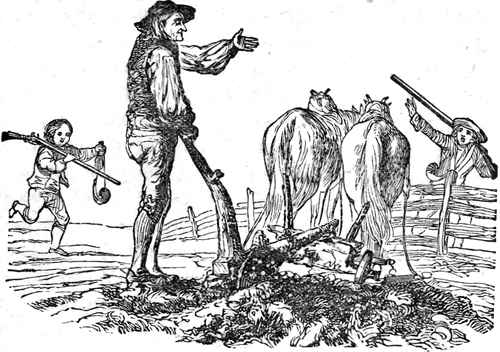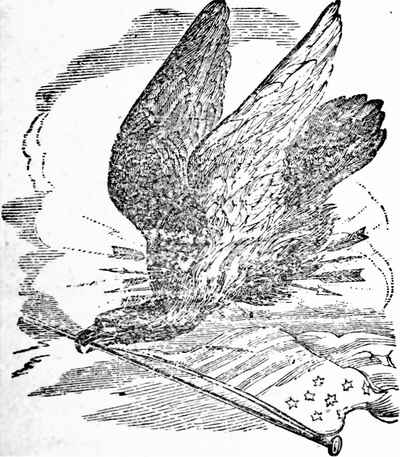Thrilling Incidents In American History
• Preface
Revolutionary War
• Opening Of The Revolution
• The Boston Massacre
• Affair of the Sloop Liberty
• Affair of the Gaspee
• The Tea Riot
• The Boston Port Bill
• The First Continental Congress-Consequent Parliamentary proceedings
• Organization of the Minute-Men
• Patrick Henry-Second Provincial Congress-First Military Enterprise
• Battles of Lexington and Concord
• Battle of Bunker's Hill
• Capture of Ticonderoga
• Second Continental Congress-Washington's Appointment
• Siege of Boston
• Incidents at the Evacuation of Boston
• Burning of Falmouth
• Arnold's Expedition to Quebec
• Siege of Quebec, and Death of Montgomery
• Scenes at Quebec during the Siege
• Expedition against Charleston
• The Declaration of Independence
• The Battle of Long Island
• Washington's Retreat through New Jersey-Capture of General Lee
• Battle of Trenton
• Battle of Princeton
• Capture of General Prescott
• Battle of Brandywine
• Battle of Germantown
• Battle of Red-Bank
• Attack on Fort Mifflin-Retirement of the Army to Valley Forge
• Battle of Bennington
• Murder of Miss M'Crea
• Battle of Stillwater
• Battle of Bemis' Heights, and Retreat of Burgoyne
• Capture of Forts Clinton and Montgomery
• Surrender of Burgoyne
• The Treaty with France
• Attack on Savannah, and Death of Pulaski
• Storming of Stony Point
• General Sullivan's Campaign against the Mohawks
• Tarleton's Quarters
• Battle of Camden, and Death of De Kalb
• Arnold's Treason
• The Loss of the Randolph
• The British Prison-Ships
• Capture of the Serapis
• Putnam's Feat at Horseneck
• Battle of Eutaw Springs
• Wayne's Charge at Green Spring
• Capture of the General Monk
• The Mutinies
• Battle of the Cowpens
• Capture of New London
• Massacre of Wyoming
• Surrender of Cornwallis
War With France
• Capture of L'Insurgente
• The Constellation and Vengeance
War With Tripoli
• Burning of the Philadelphia
• Bombardment of Tripoli
• Loss of the Intrepid
• Expedition of General Eaton
Second War With England
• Battle of Tippecanoe
• Capture of the Guerriere
• Tragical Affair of an Indian Chief
• Battle and Massacre at the River Raisin
• Captain Holmes's Expedition
• Capture of the Caledonia and Detroit
• The Wasp and Frolic
• Gallant Conduct of Lieutenant Allen at the Capture of the Macedonian
• Capture and Destruction of the Java
• Siege of Fort Meigs
• Capture of York, and Death of General Pike
• Defence of Sackett's Harbour
• Defence of Fort Stephenson
• Battle of Lake Erie
• Battle of the Thames
• Gallant Action of Commodore Chauncey under the guns of Kingston Citadel
• The Sacking of Hampton
• Capture of the Peacock
• Massacre at Fort Mimms
• Surrender of Weatherford
• Battle of Niagara
• BattIe of New Orleans
War With Mexico
• Battle of Palo Alto
• Battle of Resaca de la Palma
• Capture of Monterey
• Battle in the Streets of Monterey
• Thrilling Scenes in the Battle of Buena Vista
• Bombardment of Vera Cruz
• Battle of Cerro Gordo
• Battles of Contreras and Churubusco
• Storming of Chapultepec


ORGANIZATION OF THE MINUTE-MEN.
 OTWITHSTANDING the numerous attempts at pacification, the breach between England
and Massachusetts was daily widening. Although allegiance to the mother
country was professedly maintained, yet the governor found himself unable to
enforce even the slightest commands. Orders for the meeting of an Assembly at
Salem, had been issued by General Gage on the 5th of October; but fearing
that, from the condition of popular feeling, they might adopt measures
prejudiciaI to the royal authority, he subsequently countermanded the order.
This measure gave so much dissatisfaction, that on
the day appointed the representatives actually met,
organized themselves into a provincial congress, and
adjourned to Concord.
OTWITHSTANDING the numerous attempts at pacification, the breach between England
and Massachusetts was daily widening. Although allegiance to the mother
country was professedly maintained, yet the governor found himself unable to
enforce even the slightest commands. Orders for the meeting of an Assembly at
Salem, had been issued by General Gage on the 5th of October; but fearing
that, from the condition of popular feeling, they might adopt measures
prejudiciaI to the royal authority, he subsequently countermanded the order.
This measure gave so much dissatisfaction, that on
the day appointed the representatives actually met,
organized themselves into a provincial congress, and
adjourned to Concord.
| Here they made choice of Hancock to be their president, and appointed a committee to present to the governor a remonstrance agamst all his recent measures, concluding with an earnest request that he would desist from the construction of the fortress whIch he was erecting at the entrance of Boston, "and restore that place to its neutral state." Gage, who, though capable of dissimulation, possessed a hotter temper than befitted his elevated station and difficult pre- dicament, took fire at this language; he expressed the warmest displeasure at the supposition of danger from English troops to any but the enemies of Eng- land; and desired the committee to convey to the congress his warning counsel that they should hasten to desist from their illegal proceedings. Disregarding his admonition and defying his power, the provincial congress adjourned to Cambridge, where, relieved' from all doubts of the. general support of America, they embraced and pursued measures of unexampled boldness and vigour. They appointed a committee to prepare a plan for the immediate defence of the pro- vince; gave orders for,the enlistment of a number of the inhabitants to be in readiness, at a minute's warning, to appear in arms; elected three general officers (Preble, Ward, and Pomeroy) to command these minute-men and the provincial militia in case of their being called to active service; and appointed a council of safety and a committee of supplies. One of the secretaries whom they elected was Benjamin Lincoln, highly distinguished as a gallant and indefatigable partisan of his country's cause. Reassembling after an adjournment of a few weeks e November, the same congress, sensible that their countrymen applauded their measures, and that their constituents were pre. pared to yield implicit obedience to their decrees, passed an ordinance for the equipment of twelve thousand men to act on any emergency, and for the enlistment of a fourth part of the militia as minute. men; appointed two additional general officers, Thomas and Heath; and sent delegates to New Hampshire, Rhode Island, and Connecticut, to request the co-operation of those provinces in completing an army of twenty thousand men. A committee was likewise appointed to correspond with the inhabitants of Canada; and circular letters were addressed to all the clergymen of Massachusetts, requesting their assistance to avert impending slavery. |
And now an America was aroused by expectation of awful conflict and mighty change. New England, upon which the first violence of the storm seemed likely to descend, was agitated by rumours and alarms, of which the import and influence strikingly portrayed the sentiments and temper of the people. Reports that Gage had commanded his troops to attack the Massachusetts militia, or to fire upon the town of 'Boston, were swallowed with th,e avidity of rage and hatred, and instantly covered the highways with thousands of armed men, mustering in hot haste, and eager to rush forward to death or revenge. Everything betokened the explosion of a tempest; awl sollle partial gusts announced its near approach, and proved the harbingers of its fury. In the close of the year, there reached America a proclamation issued by the king, prohibiting the exportation of military stores from Great Britain. The inhabitants of Rhode Island no sooner received intelligence of this mandate, than they removed from the public battery about forty pieces of cannon; and the asselnbly of the province gave orders for procuring arms and martial stores, and for the immediate equipment of a military force.
